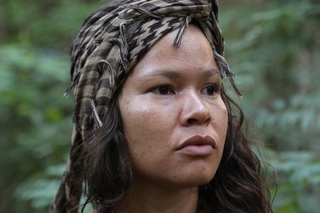In-person
Past Event: Olinda Yawar Tupinambá, Ziel Karapotó, and Jamille Pinheiro Dias

This event has passed.
- Past Event: Fri Nov 15, 2024 12:00 p.m.—1:00 p.m.
Indigenous Cinemas and Futurities in Brazil
What do contemporary films by Indigenous filmmakers from Brazil tell us about the worlds we inhabit? How do Indigenous cinemas help us imagine the future in times of crisis?
Join us on Friday, November 15, for screenings of short films by Olinda Yawar Tupinambá and Ziel Karapotó. After the screenings, conversations with the filmmakers will follow, moderated by Jamille Pinheiro Dias, Kevin W. Ennis, and students from Portuguese courses here at Yale.
Films will be subtitled in English. The subsequent conversation will be in Portuguese.
Location
Alice Theater, HQ L01
Humanities Quadrangle
320 York St.
About the Speakers
Olinda Yawar Tupinambá, who belongs to the Tupinambá and Pataxó Hãhãhãe peoples, is a multi-talented journalist, photographer, screenwriter, director, curator, performance artist, filmmaker, and environmental activist. Her work “Equilíbrio” [“Balance”] was showcased at the 60th Venice Biennale in 2024. She has curated several festivals and film exhibitions, including the Cine Kurumin Indigenous Film Festival, Mostra Lugar de Mulher é no Cinema, and the first Indigenous Film and Culture Festival — FeCCI 2022. She also produced two film exhibitions: Mostra Paraguaçu de Cinema Indígena and Amotara — Olhares das Mulheres Indígenas (2021). In 2015, she earned a degree in social communication with a specialization in journalism from Faculdades Integradas Ipitanga (FACIIP). Through her artistic endeavors, she challenges and dispels racialized and stereotypical perceptions of Indigenous peoples. Her work serves to amplify ancestral voices, condemning historical and contemporary anti-Indigenous violence while also asserting the significance of Indigenous territories, bodies, existences, and expressions, underscoring the enduring presence of Indigenous peoples across time. Her work emphasizes that Indigenous individuals, cultures, and knowledges are integral to the contemporary world, drawing from the Indigenous past to redefine and update narratives of Indigeneity.
Ziel Karapotó is a visual multimedia artist, filmmaker, actor, and cultural producer hailing from the Karapotó community of Terra Nova, São Sebastião in the Brazilian state of Alagoas and currently residing in the Indigenous territory of Marataro Kaetés, Igarassu in the state of Pernambuco. His work has garnered recognition on both national and international platforms. Notably, his artwork “Cardume II” (2024) was showcased at the 60th Venice Biennale in 2024. His short film “The verb became flesh” [“O verbo se fez carne”] (2019) received the prestigious “From Another Sky” [“De um outro céu”] prize in 2020. He has actively contributed to the research groups Ciência e Arte indígena no Nordeste [Indigenous Science and Art in the Northeast] (CAIN-UFPE) and Culturas de Antirracismo na América Latina [Cultures of Anti-Racism in Latin America] (CARLA-UFBA). Since 2021, he has served as the general coordinator of the Associação de Indígena em Contexto Urbano Karaxuwanassu [Association of Indigenous Peoples in Urban Contexts] (ASSICUKA). His artistic practice and knowledge-making are deeply rooted in the traditions of his ancestors, serving as a form of resistance and anticolonial strength, aligning with his belief in the enduring power of Indigenous art and science.
Jamille Pinheiro Dias is the Fall 2024 Craig M. Cogut Visiting Professor at the Center for Latin American and Caribbean Studies at Brown University. She is the director of the Centre for Latin American and Caribbean Studies and the co-director of the Environmental Humanities Research Hub at the University of London, where she also works as a Lecturer. She was previously a von der Heyden Fellow and an affiliate faculty member at the Franklin Humanities Institute's Amazon Lab at Duke University. Prior to working in London, she was a Research Associate at the University of Manchester as part of the project Cultures of Anti-Racism in Latin America, funded by the United Kingdom’s Arts and Humanities Research Council. Her studies involve the environmental humanities, Amazonian cultural production, Indigenous arts, and translation studies in Latin America, with a focus on Brazil.
Co-sponsored by the Yale department of Spanish and Portuguese.